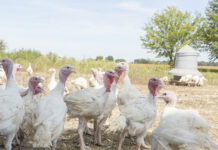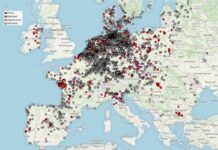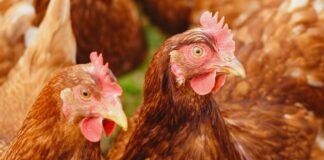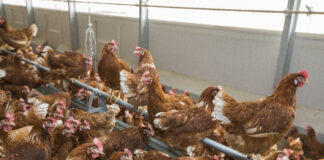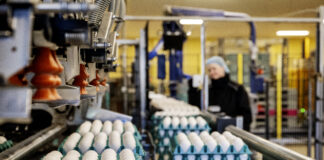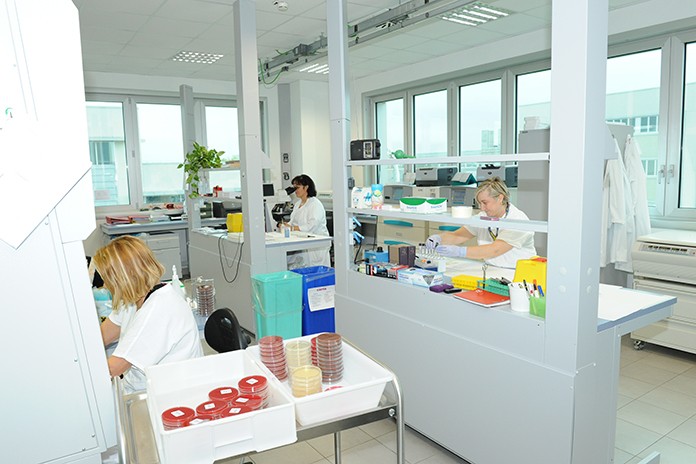
A consortium of 22 academic and animal health industry partners in Europe gathered to share novel findings that promote innovation and digital technologies that can help producers improve the health and wellness of pig and poultry herds and enhance production efficiency.
The partners have been collaborating for 21 months, under the EU-funded ProHealth project, to explore and develop new ways to combat major production diseases, limit environmental impact, promote animal welfare, and preserve profitability for farmers and those who rely on animal food production.
With unique expertise and geographic representation, the partnership is ideally positioned to address scientific challenges, derive meaningful epidemiological data, evaluate test interventions across diverse real-world systems, and propagate outcomes.
“The aim of our meeting was to share learning and experience of the last two years since we launched our project to improve the competitiveness and sustainability of modern pig and poultry farming in Europe. The key point of difference of ProHealth with respect to earlier projects is a holistic approach focusing on understanding the multifactorial dimension of animal diseases linked to the modernization of production, and using this knowledge to develop, evaluate, and disseminate effective control and improvement strategies for reducing negative impact throughout the EU and at the same time address the major challenge of global food security,“ said the consortium’s coordinator Professor Ilias Kyriazakis of Newcastle University.
Understanding causality of diseases to better prevent them
To that end, ProHealth is addressing the major production diseases of pigs and poultry (broiler and egg-laying chickens and turkeys) raised in a wide range of conventional systems across the EU. The complexity, causality, extent and risks of different disease states and their interactions are examined under field conditions. Epidemiological and experimental approaches have been applied to investigate links between genetic predisposition and environmental stressors (housing, nutrition, management), in addition to the dynamic influence of environment on disease.
According to Clint Lewis, President of Zoetis International Operations, this project is a prime example of effective public-private alliances in animal health research. “By combining resources and sharing expertise, we can speed innovation in animal health and support livestock veterinarians and producers as they strive to limit disease and increase productivity in their animals to supply increasing global demand for high quality meat. We at Zoetis are honored to be a founding partner in this consortium.”
Healthier animals for safe and sustainable food production
ProHealth is identifying risk factors and delivering novel diagnostics to predict the propensity of production-disease development in animals, communication tools for increasing awareness and sharing knowledge (such as e-learning), in addition to spearheading technological advances. Putting the multifactorial improvement strategies into practice will yield better quality products that will raise animal production standards worldwide.
“One of the highlights of our meeting is to see the adaption of our new interventions from farmers in several EU countries and the great interest of the scientific community in our contribution to continuous improvement in animal welfare and sustainable farming,” said Nathalie Le-Floc’h, a senior researcher at INRA, France. “We envision this project serving as a catalyst for innovation in the pig farming industry both in France and the broader European community. During the course of this project we demonstrated that in addition to genetics, good management practices, i.e. nutrition, hygiene of housing, biosecurity, are key mitigation tools to prevent production diseases.”
Dominiek Maes, Professor at Ghent University, Belgium, also explained: “We observe a large variation in biosecurity scores between pig and poultry farms in different European countries. Based on our detailed analysis it is now possible to derive tailor-made recommendations for improving management and biosecurity practices.”
“The work we, together with our partners, has the potential to accelerate the advent of modern technologies in intensive animal production systems and is a strong example of Zoetis’ commitment to innovative services and technologies that will bring tangible value for our customers and society at large,” said Theo Kanellos, Director, Commercial Alliances and member of the ProHealth executive team. “We have engaged leading European-based partners with a complementary mix of capabilities needed to uncover new insights for veterinarians and livestock producers to enhance poultry and swine wellness, bolster production efficiency, and improve profitability and competitiveness.”
Over the next 40 years, the Food and Agriculture Organisation of the United Nations (FAO) projects that the global requirement for animal protein will increase by 50%. Sustainability will be essential to meet this global demand for affordable, safe, and quality food. ProHealth is working to develop viable new practices to address this need. Additionally, according to the World Organisation for Animal Health (OIE), 30% of food production is lost due to infectious and non-infectious diseases occurring at farm level and at both a European and global level. ProHealth will take aim at this loss, which if not addressed, will limit the ability to respond to demand for animal protein, as well as compromise animal health and welfare.
About ProHealth
The ProHealth (Production HEALTH – Sustainable intensive pig and poultry production) consortium is a healthy blend of 10 academic partners, 1 European association, 4 industry partners, and 7 SMEs (Small and Medium-Sized Enterprises) coordinated by Newcastle University with expertise in veterinary science and epidemiology, animal physiology and immunology, socioeconomics, genetics and nutrition, as well as the welfare and production science of pigs and poultry.
It draws its members from United Kingdom, Belgium, Cyprus, Czech Republic, Denmark, Finland, France, The Netherlands, Poland, Spain and Switzerland. In 2014, the ProHealth consortium had been awarded the largest ever grant given by the European Union (EU) in the Animal Health field to identify new solutions to reconcile modern animal production systems and sustainability.


